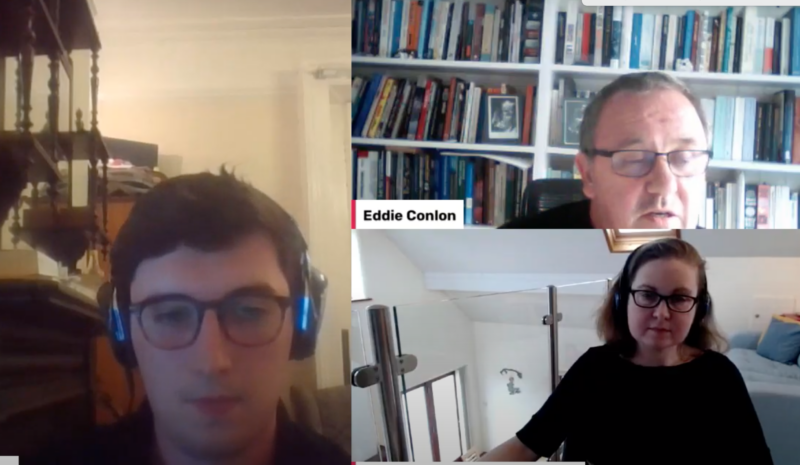The Postgraduate Workers’ Alliance of Ireland tonight discussed the problems facing postgraduate students and the future of its movement, at the launch of its national petition, which calls on the government to recognise PhD researchers as workers.
The launch featured guest speakers Maria Delaney, an investigative journalist at Noteworthy.ie and Eddie Conlon, lecturer at TU Dublin and union activist with Teachers Union Ireland (TUI).
Beginning the event, Tom Dineen, TCD Postgraduate Workers’ Alliance Chair, described the central issues facing postgraduates in higher education institutions across the country, focusing on pay and employment rights.
Dineen went on to highlight how postgraduates – as casual workers – are not guaranteed certain rights, adding that this creates an environment of precarity. He noted in particular that there is a “heavy reliance on casual staff at Trinity”.
Delaney, who recently published several investigative articles for Noteworthy.ie about postgraduate working conditions, said that contracts of indefinite duration were the biggest issue facing postgraduates.
She said that many students described having an unclear role within their institution that developed over years. Often beginning as casual teaching without a contract, Delaney said students found themselves years later still in precarious employment.
Based on freedom of information requests she made to the Irish higher education institutions, Delaney also discovered that many do not keep records of unpaid teaching.
The topic of precarious employment featured heavily throughout the event, with much focus being placed on solutions to the issue. Indeed, much attention was given to how postgraduates could bring senior teaching staff on board with the issues and promote dialogue regarding PhD workers’ rights.
Conlon went on to state the importance of bringing full-time workers on side through open discussions, telling the audience that “people can be won around”.
He argued that unionisation is the most powerful tool postgraduate workers have in their fight against precarity.
Conlon pointed out that postgraduates at institutes of technology do not face issues on the same level as those working in universities, largely because they have a higher rate of union membership.
While Conlon admitted his own union’s policy of accepting postgraduates only if they have a teaching role is problematic, he said that students should take advantage.
The key to progress within unions, Conlon said, is “dialogue”. Dineen and Conlon agreed that the movement will require help from full-time staff in order to succeed.
“Some are comfy,” and so may not want to risk backlash, Conlon said, but added: “Precarity is good for no one”.
Setting out their solutions to the problems faced by postgraduates, Dineen pointed to the Alliance’s 10-point charter for Postgraduate Workers’ Rights and Reform. Among its requests include a call for unpaid teaching to end and recognition of PhD researchers as workers with employee status.
The issue of stipends also came to the fore, with Delaney pointing out that when she was at Trinity in 2007 there were PhD positions advertised with a stipend of €18,000. Some 14 years on that specific stipend has only increased marginally after years of stagnation. Delaney also referred to Trinity offering stipends as low as €13,000 for Ussher PhD candidates.
Dineen noted that the charter pledges that PhD researcher salaries should not be below the living income in the city where the PhD researcher is based, indicating that current stipends are “indiscriminate” and not based on the city that postgraduates live in. He went on to highlight how the Wellcome Trust in the UK had adjusted stipends based on the location of the PhD candidate,
Contrasts with the situations of PhD candidates across Europe were aplenty. Both Dinneen and Conlon made the comparison to European countries such as Sweden which recognise PhD candidates as workers.
“The countries that do have workers rights, those countries happen to be the research leaders within Europe,” Dinneen said.
He also pointed out that depending on the stipend or sector, certain postgraduate students, such as those on Marie Skłodowska-Curie Actions stipends, are considered workers in Ireland even if they have the same responsibilities as other PhDs.
Dineen suggested that Ireland has too much of a tendency to look inward. “Our competition is not just Irish universities,” he said, adding that Ireland’s institutions should be matching those in Europe and internationally.







